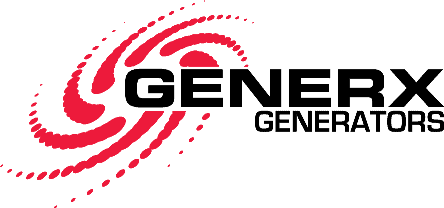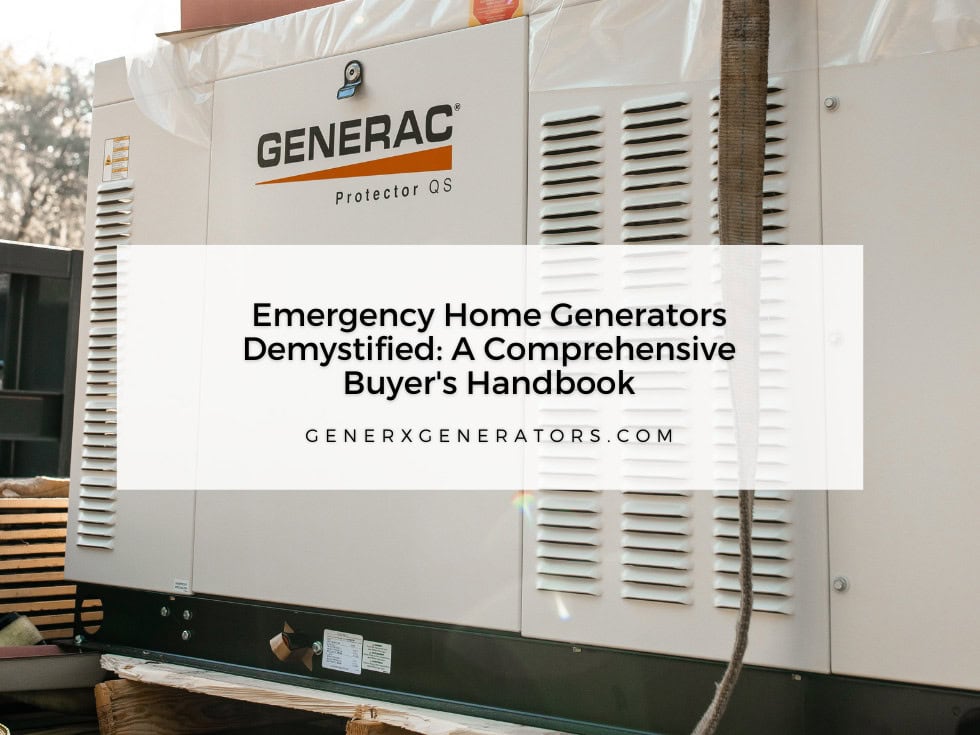Emergency home generators are very helpful during an outage. When you don’t know how long power will be out, an emergency home generator will ensure comfort and safety in your home. In this handbook, we will guide you through the world of emergency home generators. From understanding power needs to exploring fuel options and installation considerations, this guide equips you with the knowledge needed to choose the perfect generator for your home.
Understand Power Needs
The first thing you should consider before buying a home emergency generator is your power needs/requirements. We recommend that you walk around your home and take note of appliances, systems, and other essential equipment you would like to run during a power outage. When doing this, be sure to look for stickers or name plates on those items to find their wattage (or look it up online) so that you can total it all up at the end. If you suspect that you may purchase new appliances or equipment in the future, you should account for those as well.
Types of Generators
When you look up home emergency generators that are on the market you will be flooded with plenty of options. However, if you know what type to look for it could help you narrow down the search. On the market, there are two common types of standby generators: air-cooled and liquid-cooled.
- Air-Cooled Generators: These generators are typically more affordable and suitable for smaller residential use. As the name suggests, they use air to cool the engine and are cheaper to install and maintain.
- Liquid-Cooled Generators: Liquid-cooled generators are more robust and suitable for larger residential or commercial use. They use liquid (usually coolant) to keep the engine cool, this allows the generator to run for longer periods of time and at higher power outputs. More benefits of a liquid-cooled generator is that it is quieter, more reliable due to better heat dissipation, and more efficient. However, it typically requires a higher initial cost.
Types of Fuels
Another thing to consider before buying an emergency power generator for home is what fuel to use. This is more-so dependent on your unique location as fuel of certain types are cheaper and more accessible in different areas. Stand-by generators are commonly fueled by:
- Natural Gas: Great for homes with existing natural gas lines. This type of fuel offers a continuous supply without the need for refueling. So, if your home already has a gas line we highly recommend looking for generators of this fuel type.
- Propane: Suitable for areas without access to natural gas lines. Propane tanks need to be periodically refilled but offer long-term storage that is generally safe.
- Diesel: More ideal for commercial application or areas with limited access to fuel sources. Diesel generators are efficient and offer higher power outputs but may require more maintenance.
Transfer Switch
A transfer switch is a crucial component for emergency home generators. What a transfer switch does is it switches the electrical load from the utility grid to the generator itself. There are two types of transfer switches.
- Automatic Transfer Switch (ATS): This type of switch will detect a power outage and automatically start the generator, transferring the load in seconds. It’s the most convenient option for homeowners and businesses.
- Manual Transfer Switch: This requires manual intervention to start the generator and switch the load. While it is less expensive, it is also less convenient as it requires you to go out and switch it.
Installation Considerations
Proper installation is essential for the safe and efficient operation of your emergency home generator. You should consider the following factors prior to installation:
- Location: Choose a location that meets local building codes and regulations. Make sure that there is adequate space around the unit to ensure airflow and maintenance access.
- Fuel Supply: Ensure you have a reliable fuel supply and that it is properly hooked up to the chosen fuel type. Work with a licensed professional to properly install gas lines or propane tanks if necessary.
- Electrical Connections: The final piece of the puzzle would be to make sure the generator is properly connected to your electrical system, including the transfer switch. We recommend having a licensed electrician do this to ensure compliance with local codes and safety standards.
Maintenance Needs
To keep your emergency home generator in optimal condition, regular maintenance is crucial. Consider the following maintenance requirements:
- Scheduled Inspections: Schedule regular inspections and maintenance checks according to the manufacturer’s recommendations. This would include oil changes, filter replacements, fluid checks (such as coolant for liquid-cooled generators), and general system inspections.
- Exercise Routine: This is when you run the generator periodically (usually once a month) to ensure proper functionality and prevent mechanical issues. This helps keep the engine and electrical components in good working order.
- Professional Servicing: Consider hiring a professional service provider to perform annual maintenance and service tasks. A professional would be able to identify potential issues early and ensure your generator is ready to perform when needed.
Noise Level
Standby generators can be very noisy when they are operating, this may be a concern depending on your location and how close you are to neighbors and other occupants. Consider the noise level when choosing a model, especially if it’s for residential use. Luckily, many modern generators are designed with noise-reducing features.
Budget Considerations
Lastly, consider your budget when looking to purchase a standby generator. You need to factor in the initial cost of the generator, installation expenses, ongoing maintenance costs, and fuel expenses. While it would be tempting to select the cheapest option, going with a high-quality generator and professional installation would be worthwhile for a long-term investment such as this.
Those are the factors you should consider when purchasing an emergency home generator. Feel free to use this guide to help you, or if it seems like a lot to take in, working with a professional such as GenerX Generators, can make things a lot easier. With GenerX Generators, we are happy to help guide you through the process and make sure you select the best home emergency generator, just click here to contact us.
Get peace of mind knowing that your home is ready to go in any situation with GenerX Generators. As a Premier Generac Dealer, we sell, install, service, and maintain Generac generators, one of the most well-established and trusted brands on the market.
Get a FREE Quote Today or Contact Us Here for any of your generator needs. Working in and around areas of Florida, here is a full list of our service areas.

